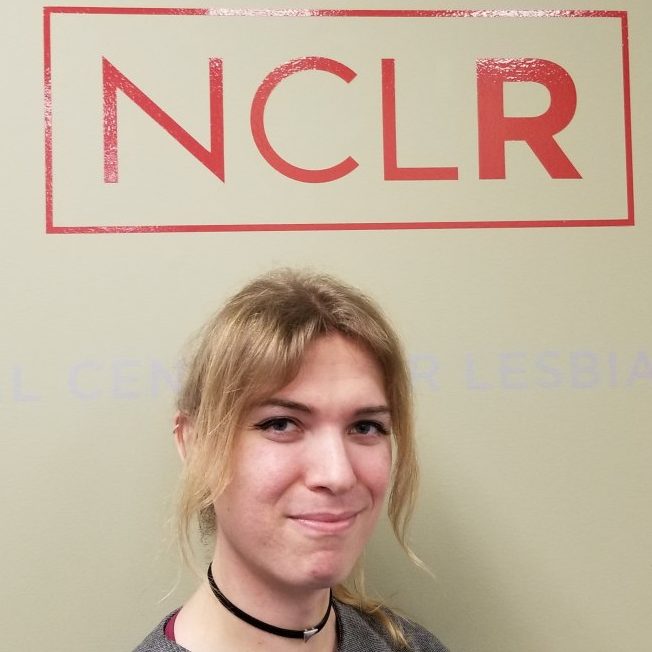International Transgender Day of Visibility (TDOV) is an annual event observed on March 31 that is dedicated to celebrating transgender individuals and raising awareness of discrimination faced by transgender people worldwide. For Transgender Day of Visibility 2021, NCLR is highlighting the voices of our transgender youth staff members who have chosen to share their experiences, expertise, and what visibility means to them.
Lexi Adsit (she/her)
NCLR Donor Engagement Manager
“When I was younger I knew I wanted to make the world a better place, so I started organizing peers in high school, continued working with various non-profit groups and social justice movements through college, and then I found a way to turn it into a career. I’m now very fortunate to feel like I can support the necessary and life-changing work we do at NCLR.”
Lexi Adsit

Lexi Adsit joined the organization in January 2020 with a passion for energizing people around NCLR’s mission and work. As Donor and Engagement Manager, Lexi is responsible for being a touchpoint, often one of the first for NCLR’s donors. Lexi also supports the communications and public education projects, as well as helps to project-manage fundraising campaigns so NCLR can continue to do its social justice and advocacy work as an organization.
Lexi’s role at NCLR allows her to meet and connect with donors that have supported NCLR since the organization’s founding in 1977.
“I love having a moment to connect with these donors because they are so fun, they care so much about our community and the world, and they also want to make the world a better place,” Lexi explains. “Also when we are able to make a difference with legal assistance or a hard-fought victory, asylum approval, filing a complaint against a conversion ‘therapist’, and so many other moments make this job fulfilling.”
Regarding NCLR’s work and the advancement of visibility for transgender and nonbinary people through means such as litigation and public education, Lexi notes NCLR’s transgender youth projects – which was the first in the country. NCLR has been leading this fight for trans people to have better lives for decades and “this supports [trans] visibility by allowing trans people to focus on just living their lives,” Lexi explains – “and that is most important.”
Maxie Bee (she/her)
NCLR Legal Assistant
“I think that Transgender Day of Visibility is a good reminder and a good call to action to put our best foot forward and to try and be there for others in our community who may not even be aware that they are in our community. But it’s also important to realize that for many trans folks, being visible is the only option. It is a powerful thing to be visible, but it is also a scary thing that is outside the control of many folks who come out. Being visible often means being an example, and having the weight of being an example for your community is not something that every trans person wants (or should be required) to do.”
Maxie Bee

Maxie Bee is one of NCLR’s Legal Assistants and joined the staff in October 2019 after completing an internship that began in January 2019 for NCLR’s Immigration Project. Most of Maxie’s work as a legal assistant revolves around maintaining the calendar and calculating important dates for the legal team, translating documents and correspondence, assisting with legal research, and processing and assisting callers via NCLR’s Legal Helpline.
Working for NCLR’s legal team is Maxie’s first paid job in an LGBTQ+ legal organization, so, as she explains, she’s just getting started in the world of social justice and advocacy.
“I have long been passionate about LGBTQ+ issues, racial justice, economic justice, and how they all intersect with each other,” Maxie said. “While my role at NCLR is mostly a supportive one, I feel like I’ve found a great niche where I can put my skills and my passion to good use.”
As NCLR is an organization that handles private legal and social justice information, a lot of the times NCLR can’t disclose or discuss everything that’s happening due to the needs of the organization’s clients – many of whom are low-income, in dangerous environments, and are in the process of dealing with some of the most challenging times of their lives. However, the results of these cases, as Maxie explains, can have immense ramifications in laying precedent for increasing protections for trans people across the board. “These protections better people’s lives in very direct and impactful ways,” Maxie elaborates, “and I think that they lay the groundwork necessary for trans people to be able to be more open and visible in our society.”
An important aspect of TDOV is not only celebrating and honoring trans people who have paved the way throughout history but also acknowledging and embracing the living members of the transgender community. This includes celebrating the victories and listening to the lived experiences of transgender people – the good, the bad, the tried and the true. This visibility can, at times, become complicated and complex, as detailed by both Lexi and Maxie.
“Transgender Day of Visibility is complicated because I’ve experienced visibility to not mean anything that makes our material conditions better as a community but just continues exploitation and violence,” Lexi explains. “I do believe we needed to become more visible to be humanized, but there’s also dehumanization efforts that harm us. I wish it was easy and fun and just that, but our lives are hard.”
In light of TDOV, Maxie further explains that, as a transgender person, visibility is an incredibly important but complex issue. While her experience transitioning was quite ‘visible’ considering her public-facing job at the time, she feels privileged that the overwhelming majority of the responses she received, both in-person and online, were of support and care and kindness. Fortunately, being visible in this way was affirming and allowed her to be more public about her transition, but it is a privilege afforded to too few. “Transgender visibility wasn’t and isn’t just a single day for me,” Maxie explains, “it is literally every day.”
TDOV is also a time to be proud, Maxie emphasizes: “The amazing spectrum of diversity in non-binary and binary trans experiences is powerful and should be appreciated for what it brings to our understanding of the inherent humanity in people. A lot of coverage about trans people revolves around the negatives or the perceived tragedies of being trans, but that’s truly not the end-all-be-all of our experiences. There can be a lot of joy to being transgender, a lot of amazing experiences that come with being trans that we would not know if we were cisgender, and I think this day is a good day to revel in that and show that side of ourselves to the world. There is immense value and perspective that is inherent to the transgender experience, and it’s worth being proud of.”
To young transgender, non-binary, and queer folks, both Lexi and Maxie offer their perspective and advice:
“My best advice is to find the joy in your life and hold onto it, we are resilient, resourceful, brilliant, and so powerful,” Lexi said. “Don’t let this world extinguish your light because they’re not ready for your magic. You can absolutely make the world change so it’s better for everyone. And if you ever need anything I’m here.”
Maxie provides her advice in twofold: “First – be yourself. The mask is tiring, and it never gets any lighter. Trying to hide your identity to spare others or yourself the stress of coming out to them does nothing but place that stress right onto your own shoulders, “ she states. “And second – it’s never too late to figure out how best to be yourself. There is no ‘magic window of time’ to come out in that if you miss then you might as well give up. Whether we come out or not, our experiences are valid and worthy of respect. Being our most authentic selves is a process, often fraught with a lot of difficulty, but we owe it to ourselves to find the paths that’ll help us live in peace and happiness.”









